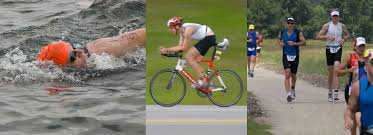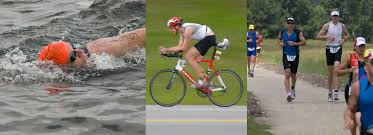
Triathlon Training Tips for Swimming, Cycling & Running
Monday, September 5, 2016
These triathlon training guidelines contain expert advice on how to use your training time efficiently for an even and effective mix of training.
First of all, cut your main sport's training time by about 30% - 50% and use that time for training in the other two sports.

Swimming
Swimming requires training that stresses efficiency and almost all tri-athletes need feedback on their stroke. Find a friend who's a good swimmer and ask them to look at your stroke - tips from a knowledgeable observer will save you weeks of struggling on your own.
Beginners should forget about speed and practise for efficiency and economy, so count your strokes per lap and try to reduce the number.
Pedalling technique
Avoid pedal stamping i.e. pushing the pedal down hard in the first half of the pedal stroke and then failing to actively pull the pedal up in the second half. To correct this, practice pedalling with one leg only on a stationary bike using your muscles to propel the pedals in full circles.
Another common mistake is mashing i.e. using a gear that's too high with a slow cadence. Learn to pedal with a high cadence - at least 80 revs/minute on the flat. If you can't keep up the cadence, shift to an easier gear.
Practise descending hills and managing corners and when you're ready for more difficult rides, do hill repetitions to build leg strength. And practise the bike to running transition for about 10-minutes, because at first your legs'll feel like rubber when you change!
Running
Regular runners should keep only the difficult runs in their triathlon training schedule, as they're the real fitness boosters. Swimming and bike workouts help you recover from hard runs in the same way that easy runs promote recovery.
Beginners should maintain an upright posture, with shoulders back and leading with the chest. Your body should be bent forward very slightly from the waist, with your head over your shoulders and not pushed forward.
Technique
Your feet should hit the ground underneath your body and not in front of it. The middle part of your foot should be hitting the ground first and not your heel. Your arm movement should be a relaxed swing forwards and back and not across your body.
Finally, it's important to do your final training in the same environments you'll be facing in the race itself. Enjoy the challenge and good luck!
